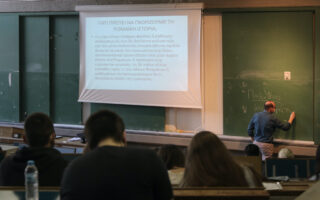A dead end packed with unemployed graduates

On the one hand, there’s a gulf between tertiary education and the job market. Of the 50,000 students who graduate from Greek universities each year, just 10,000 have the necessary skills to find related work immediately, according to a recent study. On the other hand, Greeks work more hours than anyone else in Europe, Eurostat has found. And as another report by Kathimerini noted, these data confirm the problematic production model applied in this country.
The arrhythmia in the labor market keeps coming back, and coming back stronger, as a subject of public discussion, sometimes even through seemingly unrelated subjects. Big personnel shortages, businesses that are unable to find enough workers to meet their needs and people with work (either as salaried employees or freelancers) aged 20 to 64 years old having to put in many more hours than their European peers – and, of course, for much lower incomes in many cases.
We could go on and on about the contradictions and black holes swallowing up manpower and productivity. But what seems to be missing from the public discussion is something much more elementary and it concerns the fact that Greeks get a lot less satisfaction out of their lives than their European peers. Why? The economic factor is certainly important but it is not alone, so the question is: Are Greeks being forced into making choices that give them no satisfaction or committing to jobs they’d rather not do? Yes, they are. And, to get even closer to the root of the issue, let’s go to the nationwide university entrance exams where unprepared and unsuspecting young men and women are being pushed into a dead end, packed with 50,000 graduates looking for work.
This confluence of arrhythmias requires a multi-pronged approach if we hope to accomplish some semblance of normalcy. Otherwise, we will continue having to fight our way out of the impasse, as politicians continue cheering us on with images and figures of improvement and growth that have a dwindling effect on the outcome. Because just as they bombard us with good news, there will be studies and surveys sending the same message: that we’re still at the dead end, but we’re just choosing not to call it that.





